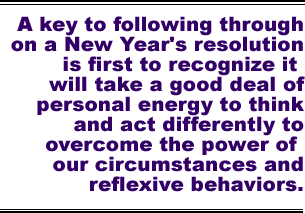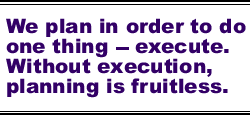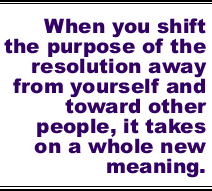Contributing Writer
- FMA
- The Fabricator
- FABTECH
- Canadian Metalworking
Categories
- Additive Manufacturing
- Aluminum Welding
- Arc Welding
- Assembly and Joining
- Automation and Robotics
- Bending and Forming
- Consumables
- Cutting and Weld Prep
- Electric Vehicles
- En Español
- Finishing
- Hydroforming
- Laser Cutting
- Laser Welding
- Machining
- Manufacturing Software
- Materials Handling
- Metals/Materials
- Oxyfuel Cutting
- Plasma Cutting
- Power Tools
- Punching and Other Holemaking
- Roll Forming
- Safety
- Sawing
- Shearing
- Shop Management
- Testing and Measuring
- Tube and Pipe Fabrication
- Tube and Pipe Production
- Waterjet Cutting
Industry Directory
Webcasts
Podcasts
FAB 40
Advertise
Subscribe
Account Login
Search
New Year's Resolutions
Making them work all year long
- By Bob Rausch, Ph.D.
- January 13, 2004
- Article
- Shop Management
What causes us to fail to follow-through on those well-intentioned resolutions we make every year? And a more important question is, How do we make them stick? Two things cause people to dump their New Year's resolutions – daily circumstances and overplanning and underexecuting.
Circumstances – The Enemy of Resolution
The greatest enemy of any resolution is the daily circumstances that cause us to lose focus and fail to follow through. Generally, daily circumstances are more powerful than any resolution we make and often rob us of our well-intentioned change in behavior.
Changing behavior is difficult. Let's say that you make a resolution to be more patient with your employees. That's a fine resolution until life becomes hectic and in the middle of all its busyness, you're presented with an occasion to practice patience. At that point it's easy to forget your resolution and respond the way you have always responded.
 |
People develop familiar behaviors that over time become second nature to them. If you have spent years responding in a certain way, it's pretty much a giventhat you will follow the path of least resistance when faced with certain circumstances. You might say that the circumstances have trained you to have an automatic response. I like the story about the guy who asked his friend, "How are you doing, Bob?" Bob's response was, "Fine, under the circumstances." The response from the first man was, "What are you doing under there?"
The good news is that all behaviors are learned, and if that's true, they can be unlearned and new behaviors put in place. I recall the leader of an organization telling me that he didn't show appreciation to his people because he "just didn't think that way." The optimum phrase is "think that way," which is exactly what he changed. The more he thought about showing appreciation, the more he did it. A key to following through on a New Year's resolution is first to recognize it will take a good deal of personal energy to think and act differently to overcome the power of our circumstances and reflexive behaviors.
Overplanning and Underexecuting
Creating and carrying out resolutions are important to personal and company growth. The custom of making New Year's resolutions provides you with a natural opportunity to make changes in your life. However, if you are not careful, developing your resolution or plan for new behavior can become overwhelming. I have known people who spent countless hours on their resolution and plans for the New Year only to get frustrated and dump the resolution. This may sound overly simplistic, but the only reason we make a resolution is to take action on it. Some people overemphasize developing the resolution and underemphasize executing it. Or the resolution is so complicated and involved it would take them forever to implement it.
 |
When I first moved to the South I heard a story that perfectly illustrates this point. Darrell was Bubba's neighbor. One day Darrell saw Bubba in his garage and walked over to talk with him. When Darrell reached the open garage, he saw all kinds of garden tools hanging all around Bubba's garage. Then he looked out the window, turned to his neighbor, and asked, "Bubba, you have some great tools, but where's your garden?" Overdoing or overcomplicating a resolution is like having a lot of tools but no garden. We plan in order to do one thing – execute. Without execution, planning is fruitless.
The Power Behind a Resolution
What's the realreason we make a New Year's resolution? The obvious answer is to develop a positive change in behavior. I believe, however, that if we are going to succeed with our resolution, it requires a deeper purpose. For example, being more appreciative of employees is a good resolution, but there has to be a stronger motivation than just showing appreciation.
The critical question is, Why do I want to be more appreciative? Some people might say it's the right thing to do, while others believe it's a leader's responsibility. Both of the beliefs are absolutely true, but the focus needs to be expanded. Wanting to be right and wanting to behave responsibly are somewhat limiting reasons and, in some cases, may be egotistical.
 |
I believe we have to get outside ourselves and expand our reason for changing behavior. The expansion occurs when we ask ourselves, "What will my resolution do for others?" When you shift the purpose of the resolution away from yourself and toward other people, it takes on a whole new meaning. For example, an expanded version of this resolution might be, "I want to show appreciation because it gives confidence and energy to my employees." This gives the resolution a greater purpose.
Resolutions work best when others receive benefit from our change in behavior. What will this resolution do for my people as I lead them? What will it do for my company? How will it benefit my family? You get the idea – how will the resolution benefit someone other than yourself? Leaders who are successful at making their resolutions or goals a reality look beyond themselves to others. However, other attributes an effective leader possesses guarantee he or she will succeed with resolutions and goals.
Before I started this article I picked up my dictionary to make sure I understood the definition of the word resolution. While reading the definition, I made a profound discovery: the word has several synonyms—words that have the same or nearly the same meaning. These synonyms for resolution are courage, mettle, spirit, and tenacity. I thought that was really cool – a resolution is courage, mettle, spirit, and tenacity. These synonyms are the internal attributes of leaders who successfully execute their others-driven resolutions.
Attributes of an Energized Leader
Courage– Winston Churchill said, "Courage is the first of the human qualities because it is the quality which guarantees all the others." Leaders must possess the mental and moral strength to venture, persevere, and withstand danger, fear, or difficulty.
Mettle– Recall the earlier example about the man who asked his friend how he was doing – "Fine, under the circumstances." A leader has the capacity not to let circumstances get him down. Good leaders have ingrained fortitude and resilience to handle strain and difficulty.
Spirit– I once heard a speaker say, "A diamond is a chunk of coal that stuck to its job." That's the quality effective leaders possess in the face of opposition or threat—an unfailing spirit.
Tenacity– Great works are not always performed by intelligence, but by tenacity. Good leaders are persistent and unwilling to admit defeat.
What resolutions did you make for the new year? With the right purposes in mind, courage, fortitude, spirit, and tenacity, you can achieve them. Have a great year!
About the Author

Related Companies
subscribe now

The Fabricator is North America's leading magazine for the metal forming and fabricating industry. The magazine delivers the news, technical articles, and case histories that enable fabricators to do their jobs more efficiently. The Fabricator has served the industry since 1970.
start your free subscription- Stay connected from anywhere

Easily access valuable industry resources now with full access to the digital edition of The Fabricator.

Easily access valuable industry resources now with full access to the digital edition of The Welder.

Easily access valuable industry resources now with full access to the digital edition of The Tube and Pipe Journal.
- Podcasting
- Podcast:
- The Fabricator Podcast
- Published:
- 04/16/2024
- Running Time:
- 63:29
In this episode of The Fabricator Podcast, Caleb Chamberlain, co-founder and CEO of OSH Cut, discusses his company’s...
- Industry Events
16th Annual Safety Conference
- April 30 - May 1, 2024
- Elgin,
Pipe and Tube Conference
- May 21 - 22, 2024
- Omaha, NE
World-Class Roll Forming Workshop
- June 5 - 6, 2024
- Louisville, KY
Advanced Laser Application Workshop
- June 25 - 27, 2024
- Novi, MI































